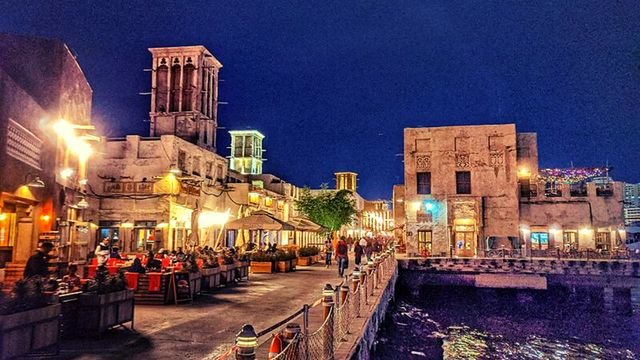Dubai, a city often synonymous with luxury and futuristic innovation, also harbors a rich tapestry of heritage and tradition. Beyond the towering skyscrapers and glittering malls lies a cultural landscape steeped in the legacy of Bedouin tribes, pearl divers, and traders. For travelers seeking an immersive journey into the UAE’s soul, exploring Dubai’s heritage offers a timeless adventure where ancient souks, golden sands, and captivating stories come alive.
Whether you’re planning your trip from West Africa or East Africa, it’s essential to understand the entry requirements in advance. For instance, obtaining a Dubai visa for Sierra Leone citizens is a straightforward process that can open the door to this unforgettable cultural journey.
The Souks of Dubai: Where Commerce Meets Culture
Step into the atmospheric lanes of Old Dubai, and you’ll discover bustling traditional markets, or souks, that have stood the test of time. Located mainly in the Deira and Bur Dubai areas, the souks are a living, breathing representation of Dubai’s trading heritage.
- Gold Souk: Famous worldwide, the Deira Gold Souk showcases dazzling displays of gold jewelry and precious gems. It’s not just a market, it’s a window into Dubai’s reputation as a global trading hub.
- Spice Souk: Just a few steps away is the Spice Souk, a fragrant maze of stalls offering saffron, dried roses, cardamom, frankincense, and traditional remedies. Walking through its alleys is a sensory overload and a culinary historian’s dream.
- Textile Souk: Across the Creek in Bur Dubai, the Textile Souk bursts with color, offering fine silks, cotton, and traditional garments like the kandura and abaya. It’s a fantastic place to experience Emirati fashion and craftsmanship up close.
These marketplaces not only reflect Dubai’s economic roots but also serve as social hubs where stories are exchanged, and generations of merchants carry forward their legacy.
Desert Sands and Bedouin Tales
Before Dubai became a cosmopolitan metropolis, it was a vast desert inhabited by Bedouin tribes. Understanding their way of life offers a rare perspective into the resilience, hospitality, and resourcefulness that have shaped Emirati identity.
Desert safaris today are not just adventure-filled activities but also cultural experiences. Visitors can:
- Ride camels, the “ships of the desert”
- Learn falconry, an ancient Emirati sport
- Enjoy traditional performances like Tanoura and Al Ayala
- Dine under the stars in a Bedouin-style camp
Such experiences immerse travelers in the heritage of the UAE’s earliest inhabitants, offering a taste of the nomadic lifestyle that existed long before skyscrapers dotted the skyline.
If you’re journeying from Tanzania, it’s important to plan your trip with the right documentation. You can apply online Dubai visa for Tanzania nationals to ensure a hassle-free entry into this captivating desert landscape.
Dubai Creek: The Birthplace of the City
No heritage journey in Dubai is complete without a visit to Dubai Creek (Khor Dubai), the waterway that shaped the city’s early development. This saltwater inlet served as the lifeline for pearl diving, fishing, and trade, industries that sustained Dubai for centuries.
Hop aboard a traditional wooden abra (water taxi) and cross from Deira to Bur Dubai, just as early traders once did. The gentle sway of the boat and the sight of wind towers and historical buildings offer a nostalgic glimpse into Dubai’s humble origins.
On the Bur Dubai side, the Al Fahidi Historical Neighborhood (Al Bastakiya) is a must-visit. Its narrow alleyways, coral-stone buildings, and art galleries tell the story of a bygone era. The Dubai Museum, housed in Al Fahidi Fort, further explores the city’s transformation through engaging exhibits and artifacts.
Heritage Sites That Tell a Thousand Stories
Dubai has worked diligently to preserve its cultural identity amidst rapid modernization. Several heritage sites across the city offer meaningful encounters with its past:
- Sheikh Saeed Al Maktoum House: Once the residence of Dubai’s former ruler, this house is now a museum chronicling the city’s political and social evolution.
- Heritage Village: Located near the mouth of Dubai Creek, this reconstructed village highlights traditional lifestyles with examples of pottery, weaving, and metalwork.
- Etihad Museum: Though modern in design, this museum celebrates the founding of the UAE and showcases the unification journey of the seven Emirates.
Each site offers a story worth listening to—narratives of vision, perseverance, and unity that define the Emirati spirit.
Cultural Events and Traditional Experiences
Dubai celebrates its heritage not just through monuments, but also through festivals, cuisine, and performing arts. If you time your visit right, you may witness cultural festivals such as:
- Dubai Heritage Week
- Al Marmoom Heritage Festival (celebrating camel racing)
- National Day Celebrations with traditional music and dance
Emirati cuisine, rooted in trade and nomadic tradition, is another avenue to experience the heritage. From Machboos (spiced rice with meat) to Luqaimat (sweet dumplings), the food tells tales of geography, migration, and trade.
Many cultural centers also offer hands-on activities like calligraphy workshops, henna painting, and Arabic coffee-making sessions—perfect for those who want to take more than just photos home.
Why Dubai’s Heritage Matters Today
In a city that changes almost overnight, preserving heritage becomes more than a cultural obligation—it becomes a compass. Dubai’s success story is not just about innovation and wealth, but also about how it honors its roots while embracing the future.
Travelers exploring Dubai’s heritage find themselves in a unique place where old meets new—where you can shop in a 200-year-old souk by day and dine in a futuristic skyscraper by night. It’s this contrast that makes Dubai not just a destination, but an experience of layered narratives.
Final Thoughts
Whether you’re drawn to the ancient traditions of the Bedouins, the enchanting tales of Dubai Creek, or the vibrant souks of Old Dubai, the city offers a rich and rewarding cultural tapestry for every curious traveler. Beyond its luxurious image lies a land of soulful stories, warm hospitality, and enduring traditions.
If you’re preparing your visit from West Africa, securing a Dubai visa for Sierra Leone citizens is a great first step toward exploring these wonders. Similarly, those in East Africa can apply online Dubai visa for Tanzania nationals to begin their heritage adventure.
Dubai invites you not just to witness its grandeur but to feel its legacy, one grain of sand, one souk, and one story at a time.



